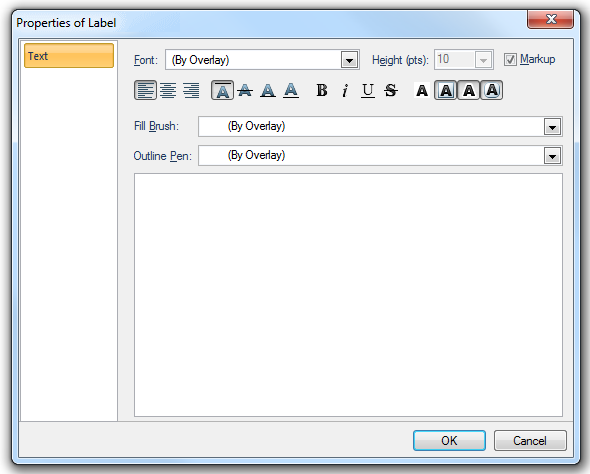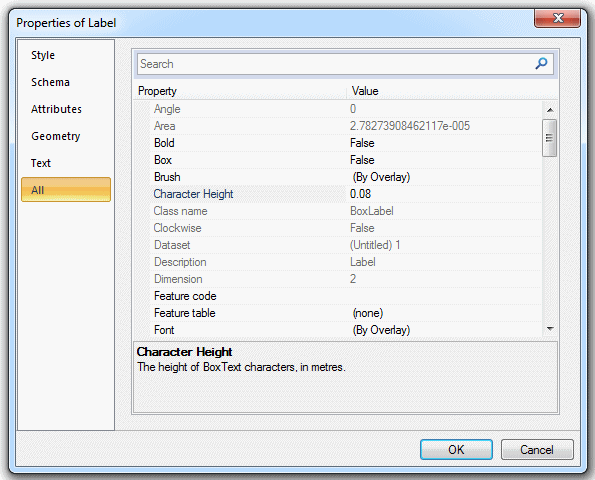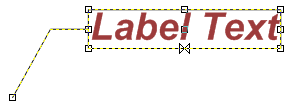 Label (Box Label)
Label (Box Label) Label (Box Label)
Label (Box Label)
 Label creates a Label item, which is a textual label with a line from the text to the location being labelled.
Label creates a Label item, which is a textual label with a line from the text to the location being labelled.
To edit Box Label text select the text and use the Text tab in either Properties [Home-Selection] or the local Properties command. See Editing Text.

Font
The text height is scale dependent and is not editable for Label Text.
Height (pts)
The text height is scale dependent and is not editable for BoxText.
Text height is specified in point sizes, the same as text in word-processing. There are 72 points to the inch. One point is approximately 0.01389 inches, or 0.353 millimetres.
Markup
The Markup option allows a single text item to have multiple states, e.g. Bold, Italic, etc., and/or multiple colours; and/or multiple fonts.
These states are:
*bold* Therefore *This is bold text* will display: This is bold text _italic_ Therefore _This is italic_ will display: This is italic ^superscript^ Therefore *Area = 25^2^* will display: Area = 252 (bold and superscript) ~subscript~ Therefore ~This is subscript~ will display: This is subscript -strikeout- Therefore -This is strikeout- will display: strikeout
Multiple text colours in a text item:
The code to set text colour is:
%{fill:#RGB values} text to be coloured%
The following line:
This is%{fill:#00AA00} green% and this is%{fill:#0000FF} blue% text
will display as:
This is green and this is blue text
Multiple fonts in a text item:
The code to set a font is:
%{font-family:FontName}
The following line:
This font is %{font-family:Castellar} Castellar% whereas this font is *_%{font-family:Times}Times in bold italic%_*.
will display as:
This font is Castellar whereas this font is Times in bold italic.
Defining Outline text:
The code to set Outline text is:
%{fill:bFill Brush colour; outline:Outline Pen colour}required text%
The following line:
%{fill:#FF0000; outline:#0000FF}red fill blue outline%
will display as:

Escape characters
Characters can be "escaped" (i.e. have their markup meaning ignored) by prefixing with a \
The following line:
*This text is bold* but \*this text isn't (it has an asterisk before and after it instead)\*
would display as:
This text is bold but *this text isn't (it has an asterisk before and after it instead)*
Justification: Left, Centre or Right
Set the text justification as required.
Vertical alignment:Top, Middle, Baseline or Bottom
Set the text vertical alignment as required.
Bold, Italic, Underline, Strikethrough
Any combination of Bold, Italic, Underlined and Strikethrough can be selected.
Opaque, Box, Outline, Rounded rectangle
Any combination of Opaque, Box, Outline (if creating Outline Text) and Rounded rectangle can be selected.
Fill Brush
Select the required brush to set the text colour. Brush colour, fill, pattern, transparency and the normal advanced settings are available.
Implicit brushes may also be defined. The facility of copying and pasting the brush specification in JSON or XML is also available.
Outline Pen
Not available for simple text. This field will become active if the Outline text A button is selected:
Preview pane
Type in the required text, use the syntax as described in Markup if required, press Enter for a new line. You can also paste text into this box using the Ctrl+C/Ctrl+V key combination, or Paste on the local menu.

When selected, label text is displayed with a box around it (like box text), with handles at the corners, mid-points and centre. A butterfly shape is displayed at the current alignment point.
The height of label text is set in real world units (same as box text). For example, label text set to a height of 2.5 metres will appear the same size as a graphical item which measures 2.5 metres.
After selecting label text, you can change its size in one of two ways:


Top of page
Send comments on this topic.
Click to return to www.cadcorp.com
© Copyright 2000-2017 Computer Aided Development Corporation Limited (Cadcorp).